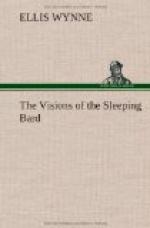The Bard hears the din of arms and news comes that the Turks, Papists, and Roundheads are advancing in three armies. Lucifer and his hosts immediately set out to meet them and after a stubborn contest succeed in quelling the rebellion. More prisoners are brought before the King— Catholics, who had missed the way to Paradise, an innkeeper, five kings, assize-men and lawyers, gipsies, laborers and scholars. Scarcely is judgment passed on these than war again breaks out—soldiers and doctors, lawyers and userers, misers and their own offspring, are fighting each other. The leaders of this revolt having been taken, another parliament is called and more prisoners yet brought to trial.
Lucifer asks the advice of his peers as to whom he should appoint his viceroy in Britain. Cerberus, first of all, offers the service of Tobacco; then Mammon speaks in praise of Gold and Apolyon tells what Pride can do; Asmodai, the demon of Lust, Belphegor. the demon of Sloth, and Satan, devil of Delusion, each pleads for his own pet sin; and after Beelzebub has spoken in favour of Thoughtlessness, Lucifer sums up, weighs their arguments, and finally announces that it is another he has chosen as his vicegerent in Britain. This other is Prosperity, and her he bids them follow and obey. Then the lost Archangel and his counsellors are hurled into the Bottomless Pit, and the Angel takes the Bard up to the vault of Hell where he has full view of a three-faced ogress, Sin, who would make of heaven, a hell, and thence departing, a heaven of hell. The Angel then leaves him, bidding him, as he went, to write down what he had seen for the benefit of others.
TO THE READER.
Let whoso reads, consider;
Considering, remember,
And from remembering, do,
And doing, so continue.
Whoso abides in Virtue’s paths,
And ever strives until the end
From sinful bondage to be free,
Ne’er shall possess wherewith to feed
The direful flame, nor weight of sin
To sink him in th’ infernal mire;
Nor will he come to that dread realm
Where Wrong and Retribution meet.
But, woe to that poor, worthless wight
Who lives a bitter, stagnant life,
Who follows after every ill
And knows not either Faith or Love,
(For Faith in deeds alone doth live).
Eternal woe shall be his doom —
More torments he shall then behold
Yea, in the twinkling of an eye
Than any age can e’er conceive.
THE VISIONS OF THE SLEEPING BARD




